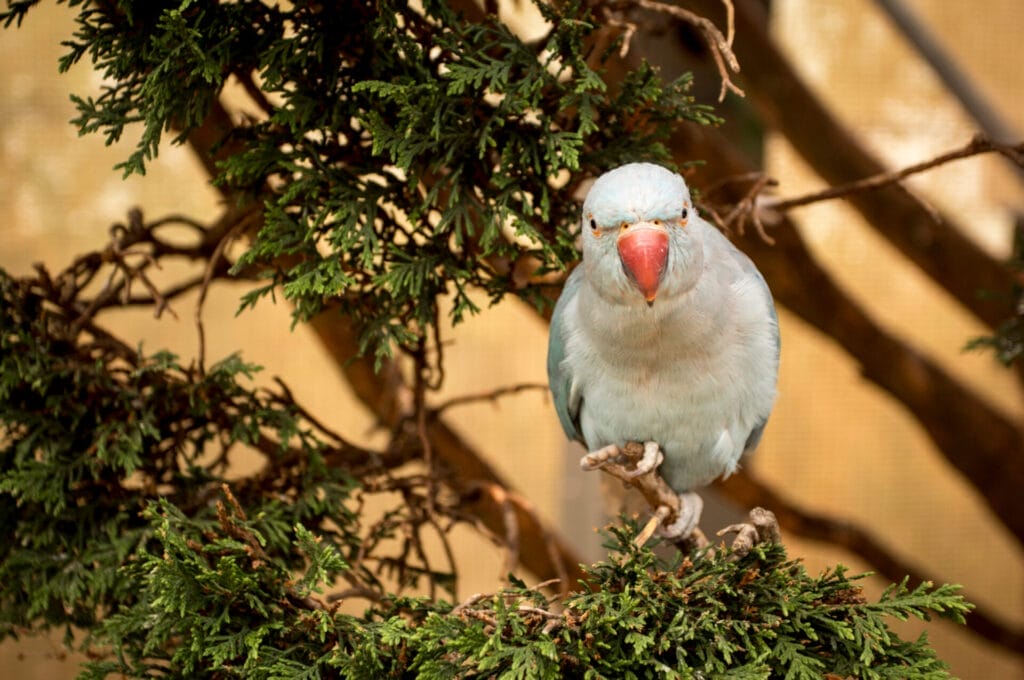
Indian Ringneck Parakeets are vibrant, intelligent, and social birds that make delightful companions. However, they require specific care and attention to thrive in a domestic setting. This article will guide you through the essentials of Indian Ringneck care and maintenance, covering everything from diet and nutrition to socialization and health issues. Whether you’re a new owner or looking to enhance your knowledge, these insights will help you provide the best environment for your feathered friend.
Key Takeaways
- Cage Setup: Ensure a spacious cage with plenty of toys and perches to keep your Indian Ringneck stimulated and comfortable.
- Diet: A balanced diet of pellets, fruits, and vegetables is crucial for their health.
- Grooming: Regular grooming and hygiene practices are necessary to prevent health issues.
- Health: Be aware of common health issues and have a plan for regular veterinary check-ups.
- Socialization: Regular interaction and socialization are key to preventing behavioral issues.
Best Cage Setup for Indian Ringnecks
A well-designed cage is fundamental to Indian Ringneck care and maintenance. These birds are active and require ample space to move around. A cage that is at least 24x24x36 inches is recommended. Equip the cage with various perches, toys, and swings to provide mental stimulation and physical exercise. Ensure the cage is placed in a well-lit area but away from direct sunlight and drafts.
Diet and Nutrition Requirements
Feeding Indian Ringnecks a balanced diet is crucial for their health. Their diet should consist of high-quality pellets, fresh fruits, and vegetables. Avoid feeding them avocado, chocolate, and caffeine, as these can be toxic. Nutri-Berries and Avi-Cakes are excellent options for providing balanced nutrition. Regularly change their water and ensure they have access to fresh food daily.
Grooming and Hygiene Needs
Grooming Indian Ringnecks involves regular nail trimming and beak maintenance. Provide cuttlebones or mineral blocks to help them naturally wear down their beaks. Bathing is also essential; offer a shallow dish of water or mist them with a spray bottle to keep their feathers clean and healthy.
Common Health Issues and Treatments
Indian Ringnecks are generally healthy but can be prone to certain diseases like Polyomavirus and Psittacosis. Regular veterinary check-ups are essential to catch any health issues early. Ensure they have a balanced diet and a clean environment to prevent infections.
Socialization and Interaction Needs
Indian Ringnecks are social creatures that thrive on interaction. Spend time with your bird daily to prevent boredom and behavioral issues. Training sessions can be a great way to bond and stimulate their minds. Use positive reinforcement techniques to teach them tricks and commands.
Conclusion
Caring for an Indian Ringneck requires commitment and knowledge. By providing a suitable environment, balanced diet, regular grooming, and social interaction, you can ensure your bird leads a happy and healthy life. Remember, each bird is unique, so be attentive to their specific needs and preferences.
Feel free to share your experiences or ask questions about Indian Ringneck care in the comments below!
FAQ
- What is the best diet for Indian Ringnecks?
- A balanced diet of pellets, fresh fruits, and vegetables is ideal.
- How often should I clean my Indian Ringneck’s cage?
- Clean the cage weekly and change the water and food dishes daily.
- What are common health issues in Indian Ringnecks?
- They can suffer from Polyomavirus, Psittacosis, and bacterial infections.
- How can I socialize my Indian Ringneck?
- Spend time with them daily, engage in training sessions, and provide toys for mental stimulation.
- What size cage is suitable for an Indian Ringneck?
- A cage at least 24x24x36 inches is recommended.
- How do I groom my Indian Ringneck?
- Regularly trim their nails, provide cuttlebones for beak maintenance, and offer bathing opportunities.
- Can Indian Ringnecks talk?
- Yes, they are known for their remarkable talking ability.
- What should I avoid feeding my Indian Ringneck?
- Avoid avocado, chocolate, and caffeine as they are toxic to birds.
- How long do Indian Ringnecks live?
- They can live up to 30 years with proper care.
- What toys are best for Indian Ringnecks?
- Toys that encourage foraging and mental stimulation are ideal.
- How can I prevent my Indian Ringneck from biting?
- Regular interaction and training can help prevent biting behavior.
- What is the natural habitat of Indian Ringnecks?
- They originate from India and are found in both rural and urban areas.
